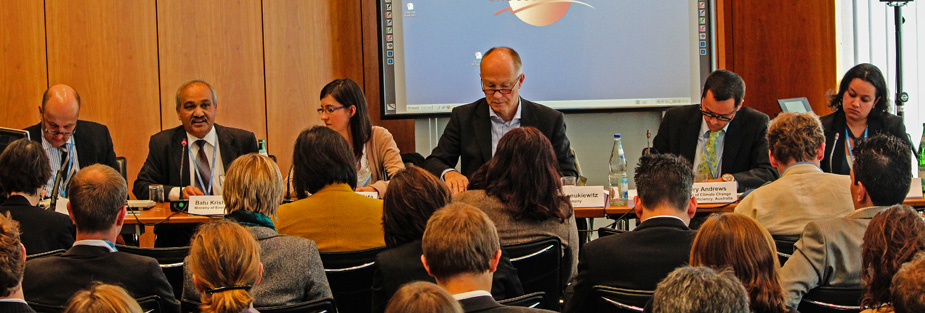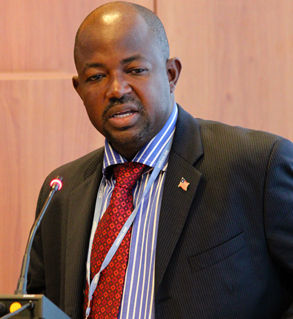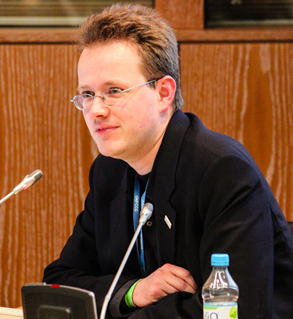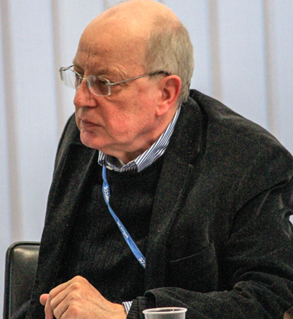|
|
The event explored the evolving climate finance architecture, including the experiences of countries implementing and providing climate finance. Manfred Konukiewitz, Federal Ministry for Economic Cooperation and Development (BMZ), Germany, chaired the event, stating that these case studies are relevant to all climate finance instruments helping transition toward low-carbon economies.
Maria Paula Mendieta, Ministry of Environment and Sustainable Development, Colombia, reported lessons from developing the Low Carbon Development Strategy. She explained international capacity-building assistance helped train other ministries to consider climate change. Mendieta said while the initial stages of policy development require considerable funding to put knowledge and institutional support in place, markets and private investment could make mitigation strategies sustainable in the long-term.
Batu Krishna Uprety, Ministry of Environment, Nepal, underscored that, in Nepal, adaptation is a survival strategy and a development agenda. He reported on Nepal’s National Adaptation Programmes of Action (NAPAs) as well as local versions, which promote awareness of adaptation at multiple levels. Uprety encouraged those “whose voices are heard to speak for the voiceless” regarding the need for timely and accessible funding.
From the perspective of climate finance providers, Norbert Gorißen, Federal Environment Ministry (BMU), Germany, cited numerous lessons from the three years of fast-start financing, inter alia: balancing allocation between sectors as well as between adaptation and mitigation; improving coordination with partner countries; and finding innovative financing sources. He stated that finance offered new ways to approach adaptation, such as micro-insurance and ecosystem-based adaptation schemes.
Gregory Andrews, Department of Climate Change and Energy Efficiency, Australia, clarified that his country is delivering on their fast-start financing commitments and will continue to after 2012. He underscored climate finance is an investment, not a disbursement, requiring enabling environments. As an example, Andrews cited the Indonesia-Australia Forest Carbon Partnership, which pays local communities to plant, monitor and care for the forest and includes long-term mechanisms for payments from carbon sequestration.
Smita Nakhooda, Overseas Development Institute (ODI), United Kingdom, reported on the Climate Funds Update, which monitors the allocation of climate funds. She expressed encouragement that momentum remains despite the financial crisis, yet said greater coherence in reporting practices and investment in institutional capacity building is required.
Eduardo Durand López-Hurtado, Ministry of Environment, Peru, summarized the key themes of the panel, including capacity building and institutional infrastructure to “channel, rationalize and order external help.” He stressed links between mitigation and adaptation, as higher mitigation support decreases future costs of adaptation. |
 |
 |
 |
 |
 |
L-R: Norbert Gorißen, BMU, Germany; Batu Krishna Uprety, Ministry of Environment, Nepal; Maria Puala Mendieta, Ministry of Environment and Sustainable Development, Colombia; Manfred Konukiewitz, BMZ, Germany; Gregory Andrews, Department of Climate Change and Energy Efficiency, Australia; and Smita Nakoohda, ODI, United Kingdom.
|
|
 |
 |
 |
 |
Moderator Soumya Dutta, India People’s Science Campaign, invited speakers to present on the range of viewpoints on the Work Programme on agriculture under the UNFCCC Subsidiary Body on Scientific and Technological Advice (SBSTA).
Identifying agriculture as a driver of deforestation, Ajay Kumar Jha, PAIRVI, warned of the gap between mitigation and adaptation. He said critical issues to be considered in the Work Programme include: failing to differentiate between smallholder and industrial farming; increasing emissions and consumption by Annex I countries; enhancing additional and predictable finance, knowledge sharing, and international cooperation; and avoiding additional trade externalities.
Teresa Anderson, the Gaia Foundation, outlined concerns with soil carbon markets based on: responsibility placed on farmers in developing countries for emissions made in developed countries; difficulty in monitoring; and lack of permanence of carbon reductions, which can stimulate market flux, potentially in the interest of investors. Warning of myths in sustainable agriculture, she shared examples from Africa where farmers suffered from the utilization of biochar, sustainable intensification and climate-smart agriculture. She cautioned that the Work Programme on agriculture could divert resources from adaptation to mitigation.
Amika Schroeder, MISEREOR Catholic Development Organization, related how strategies aiming to reduce deforestation can put pressure on agriculture to produce higher yields. She called for clarification during the Work Programme dialogue to identify the drivers of deforestation. She named land tenure rights as a top priority for sustainable agriculture. To address deforestation and emissions from agriculture, she called for re-channelling existing investments from conventional agriculture, as well as regulation, enforcement and education. |
Markku Kanninen, University of Helsinki, introduced a panel on the design and implementation of REDD+, including findings from CIFOR’s Global Comparative Study of REDD+, which aims to support practitioners with tools for delivering effective, cost-efficient and equitable carbon reductions.
Maria Brockhaus, CIFOR, explained that the Global Comparative Study on REDD+ investigated the interplay of ideas, interests, institutions and information in REDD+ implementation in eleven countries. She indicated that transformational change for REDD+ was possible through economic incentives, new ideas and information, and new actors and coalitions. Brockhaus conveyed several examples of change, through, inter alia: regional governance frameworks; industrial forest policy reform; and removal of subsidies and other perverse incentives for deforestation.
Monica Di Gregorio, University of Leeds, said that a comparative policy analysis of seven countries reveals slow progress in the formulation of national REDD+ strategies due, in part, to weak governance and entrenched political and business interests. She noted four preconditions for overcoming political and economic constraints to REDD+ implementation: state autonomy from interests driving deforestation and forest degradation; national ownership of the REDD+ policy process; participation in the policy process; and coalition building.
Lasse Loft, Biodiversity and Climate Research Centre (BiK - F), described discourses on efficiency, effectiveness and equity about benefit sharing in REDD+. He also said that a minority of projects currently involve direct payments to households, but that direct payments may become more significant as REDD+ readiness proceeds.
Louis Verchot, CIFOR, highlighted the capacity gaps facing national Measuring, Reporting, and Verification (MRV) systems, noting that only a few countries have narrowed these gaps since REDD negotiations began in 2005. Verchot offered a “step-wise” approach for incrementally meeting the needs of different countries. He also noted the potential contributions from community MRV.
Discussions covered a range of topics, including the monitoring of benefit sharing, the “behind the scenes” influence of business, the role of the media, and the trust and predictability required for effective finance. |
|
|
 |
 |
 |
 |
 |
| Benjamin Karmorh, Environmental Protection Agency, Liberia, said the implementing measures identified under mitigation in the I&FF assessment would reduce emissions by 67% making the country carbon neutral. |
|
 |
 |
 |
 |
|
Rebecca Carman, UNDP, discussed the UNDP project providing capacity development for policymakers to address climate change, which undertook investment and financial flows (I&FF) assessments helping assess the financial landscape and understand needs and how those needs can be met. She said the methodology provides groundwork for climate finance readiness.
Susanne Olbrisch, UNDP, described the methodology for I&FF assessments. She highlighted that the methodology is a robust, bottom-up, development-oriented, country-led and participatory approach. She said results were being used by governments, inter alia, to: develop climate change policies; provide baseline information for public expenditure and investment review; and incorporate into national adaptation plans.
Benjamin Karmorh, Environmental Protection Agency, Liberia, highlighted the benefits of the I&FF assessment for Liberia, noting that the two sectors they chose to focus on during the assessment were energy and forestry, under mitigation, and agriculture, under adaptation. He said the I&FF assessment identified the need for US$ 2.89 billion in investment through 2030 to implement priority actions in the three key sectors, including: improving efficient energy production and using and promoting renewable energy; establishing sustainable forest management, forest enrichment and restoring plantations; and using resistant species, improving soil quality and fighting plant diseases. He envisaged that the results would influence national budget allocations and help reinforce awareness of climate change.
Pa Ousman Jarju, Ministry of Fisheries, Water Resources and National Assembly Matters, the Gambia, said it is critical to catalyze private finance. He said the assessment identified the need for US$1.71 billion in investment needed through 2030 in the Gambia to implement actions to reduce emissions of GHGs from the energy sector and forest degradation and adapt to the climate impacts on agriculture and water resources. He said the assessment provided input into the Second National Communication, to be validated in 2012, and the Low-Emission Climate Resilient Development Strategy and the National Climate Change Policy, which are under preparation.
Discussions highlighted: the need to identify investment partners, such as through detailed feasibility studies and terms of reference; project challenges and how they were managed; and links between I&FF assessments and changes in development policy and planning, to create enabling environments and catalyze investment. |
|
|
 |
 |
 |
 |
 |
| Wolfgang Sterk, Wuppertal Institute, reviewed the pros and cons of possible designs for NMMs. |
|
 |
 |
 |
 |
|
Andrei Marcu, CEPS, outlined the paper Expanding Carbon Markets Through New Market-Based Mechanisms, which is designed to review UNFCCC parties’ submissions and identify issues. He described challenges to be faced in defining the relationship between the UN and UNFCCC, the UNFCCC and the private sector, and existing and emerging standards. He concluded noting these unresolved issues pose challenges to negotiations.
Hans Bolscher, ECORYS, introduced a panel of experts including, Stefan Bakker, Energy Research Centre of the Netherlands (ECN), Wolfgang Sterk, Wuppertal Institute, and Jelmer Hoogzaad, Climate Focus, to present possible design options for a "new market-based mechanism" (NMM). They described a process of assessing key design elements against: nine criteria; three options for establishing baselines; and two options for governance. They said these elements produced three designs and the final selected design will be piloted in hypothetical case studies from five sectors in five countries.
Several panelists discussed the need for additional resources, requiring secure demand for the NMM and need for fungability.
Giovanni Bertolino, Enel, shared key messages resulting from discussions with the private sector on the design of NMMs, inter alia, the need for: scaling-up private sector involvement globally; incorporating the Clean Development Mechanism (CDM); basing it in top-down regulations and bottom-up implementation; and including incentives for host countries.
Eva Filzmoser, CDM Watch, reflected on net atmospheric benefits, questioning how to monitor, define and verify these. She described a system to avoid double counting and pointed out the importance of addressing human rights issues for transparency.
Jusen Asuka, Climate Change Group, IGES, pointed out discrepancies in defining business-as-usual, impacting credit schemes.
Hugh Sealy, Ministry of Finance, Planning, Economy, Energy, Foreign Trade and Co-operatives, Grenada, encouraged inclusion of a common set of rules, top down approach, no double counting, and clear governance under COP. He warned against governance through panels of experts as a way to avoid political challenges, as the experts are likely to be appointed largely by Annex I parties.
Yuji Mizuno, Ministry of the Environment, Japan and Toshi Nagata, Ministry of Economy, Trade and Industry, Japan, shared ideas for a Bilateral Offset Credit Mechanism, offered in parallel to other mechanisms. |
|
|
 |
 |
 |
 |
 |
| Dennis Tirpak, WRI, noted that the lifestyle and industry changes in Japan after the Fukushima disaster may remain once energy supplies are restored. |
|
 |
 |
 |
 |
|
This event provided a sample of IGES research on a broad range of issues relevant in the Asian region. Jusen Asuka, Climate Change Group, IGES, explained the panel hoped to inform countries on highly relevant issues.
Asuka presented his research on new alliances and climate unilateralism as two trends in global climate negotiations and policy action. He explored climate unilateralism through a case study of the EU Emissions Trading Scheme (ETS) extension to the aviation sectors. He stated that the EU’s action is compatible with WTO rules, but may require further dialogue with developing countries. He reported that China may be considering including aviation in its planned domestic carbon trading scheme.
Yasushi Ninomiya, Market Mechanism Group, IGES, reported preliminary results on capacities to develop MRV systems. He explained his approach was bottom-up, based on what is possible and necessary for a given country, which differs from the CDM’s top-down approach. One finding he identified is that the concept of standardized baselines could be possible, if adjusted for national circumstances. He stated this could simplify MRV objectives and methodology while maintaining environmental integrity.
Federico Lopez-Casero, Forest Conservation Team, IGES, presented his work on the quality of governance standards for REDD+ MRV. He noted MRV tools are available to measure forest carbon, but not for governance safeguards. He demonstrated how to create and test a quality of governance standard at the national level using pilot study in Nepal.
Takeshi Kuramochi, Climate Change Group, IGES, provided the context for his research on GHG emissions after the Fukushima disaster. He explained that before the disaster, Japan was the world’s third largest user of nuclear power and on track to meet their Kyoto Protocol commitments. Kuramochi described the current situation as “highly uncertain.” He reported the analysis results would be available in June 2012.
The panel invited Dennis Tirpak, World Resources Institute (WRI), to provide comments, including reference to a report he had written on bunker fuels. The audience expressed interest in seeing future results. |
 |
 |
 |
 |
Daily web coverage
(click on the following links to see our daily web pages)
|
|
|
|
|
 |
 |
 |
 |
 |
 |
 |
 |
 E-mail the
Digital Editor
should you have any questions regarding the content of this page
E-mail the
Digital Editor
should you have any questions regarding the content of this page |
 |
 |
 |
 |
|
|
|
|